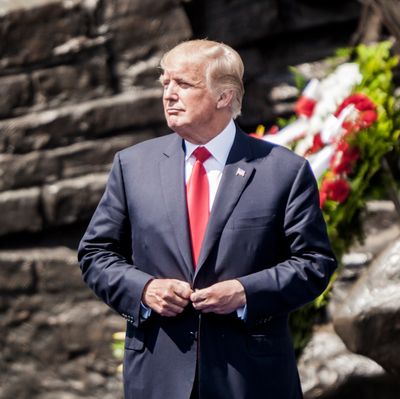
President Donald Trump’s visit to Warsaw prior to the G20 summit in Hamburg was a whirlwind affair, tightly scheduled and lasting less than a day. It was so tight, in fact, that he was unable to squeeze in a stop at the monument to the 1943 Warsaw Ghetto Uprising, sending his daughter Ivanka to lay flowers there instead.
With that decision, Trump became the first U.S. president in nearly 30 years not to pay his respects at the monument on his first state visit to Poland. Leaders of the Jewish community there expressed disappointment in his decision to skip it.
Coming just days after the president retweeted a video of himself beating up CNN from an account that turns out to have also trafficked in vicious anti-Semitism (once again), the omission was bound to draw notice and criticism from Jews in Poland as well as the U.S. It was also suspiciously convenient to the political agenda of Poland’s ruling party, Politico’s Annie Karni notes, as the right-wing nationalist Law and Justice Party has worked to refocus Poland’s historical memory of the Holocaust on its Polish victims and heroes (of which there were indeed very many) and away from the virtual eradication of the country’s millennium-old Jewish community — much less any Polish complicity in that atrocity, the mere mention of which the ruling party has sought to criminalize.
This is not to suggest that Trump’s travel itineraries reveal anti-Semitic intentions. But it’s part of a pattern of participating in situations and categories of political rhetoric with anti-Jewish undercurrents.
In his Warsaw speech, Trump referred frequently to “the West” and to “our civilization,” going so far as to state grandiosely: “The fundamental question of our time is whether the West has the will to survive.” This claim, Peter Beinart observes at The Atlantic, “only makes sense as a statement of racial and religious paranoia”:
The “south” and “east” only threaten the West’s “survival” if you see non-white, non-Christian immigrants as invaders. They only threaten the West’s “survival” if by “West” you mean white, Christian hegemony. [ … ] So when Trump says being Western is the essence of America’s identity, he’s in part defining America in opposition to some of its own people. He’s not speaking as the president of the entire United States. He’s speaking as the head of a tribe.
What makes this language particularly notable in this context is that the crowd Poland’s government bussed in to cheer Trump on may have an even more circumscribed view of who does and does not belong in the West. While the Law and Justice Party is not overtly anti-Semitic, the same cannot be said for all of its supporters, and its perspective on history betrays a certain resentment of the prominence given to the Jewish experience in the Holocaust. Bolstered by the government’s right-wing populism and xenophobia, anti-Semitism has come into vogue again in the home of Auschwitz and Sobibor in recent years, just as it has in other European countries.
Hungary’s right-wing prime minister, Viktor Orban, for instance, may insist that his latest campaign of posters depicting George Soros as a sinister caricature of the laughing Jew is just about Soros, the individual — but it’s not convincing. Not incidentally, the Orban and Trump administrations are disturbingly friendly. Orban welcomed Trump’s inauguration as “the end of multilateralism” and has praised Trump’s heavy-handed approach to controlling immigration; Trump’s Islamophobic counterterrorism advisor Sebastian Gorka was also once an advisor to Orban.
Trump may be drawn to European nationalists like Orban by nothing more than their shared suspicion of Islam, but he is apparently blind to the anti-Semitism that tends to co-exist with that variety of Islamophobia.
In the same vein, he either doesn’t understand or doesn’t care that his diatribes against liberal internationalism and his attacks on the press have origins in old school anti-Semitic conspiracy theories and serve as dog whistles to Jew-haters, even as his supporters repurpose the Nazi slur lugenpresse and alt-righters gleefully tweet about an impending “journocaust.” To be sure, the new anti-Semitism is by no means exclusive to the right — just ask those G20 protesters in Hamburg what they think of Jews. But it’s no accident that anti-Semitic incidents spiked 86 percent in the first few months of the Trump administration, as the alt-right celebrated what they saw as their victory.
Yet whether out of ego, ignorance, or cognitive dissonance, Trump is unwilling or unable to grapple with the possibility that he might be enabling that spike. Indeed, he seems not to even understand the connection. That makes him no less unsettling.





























